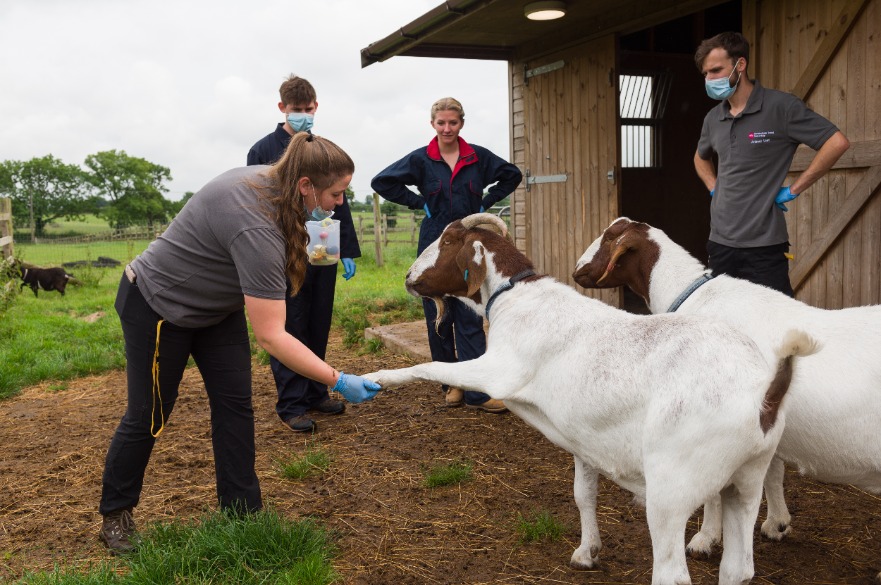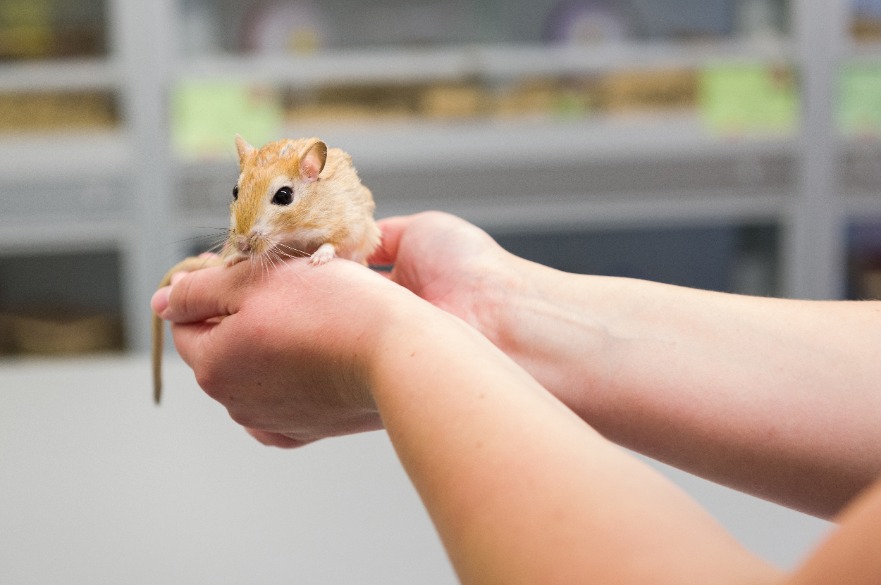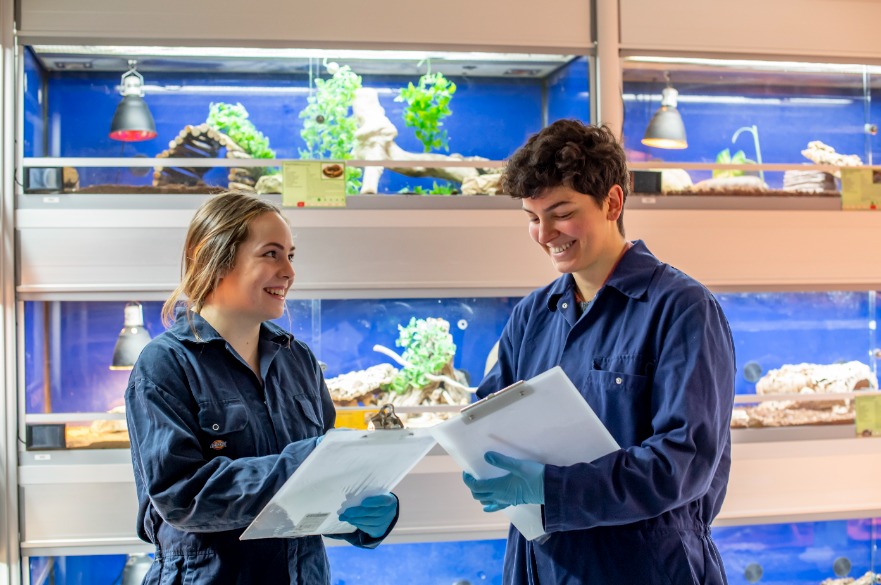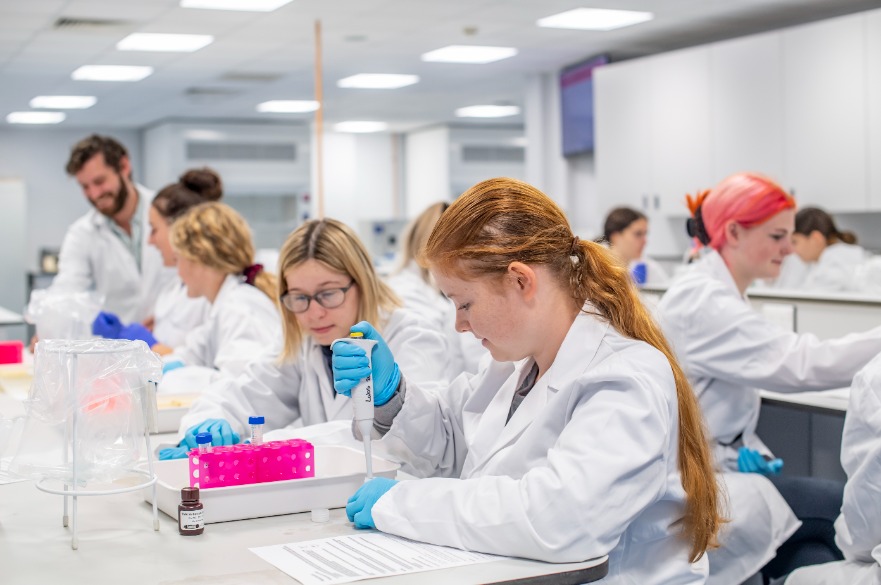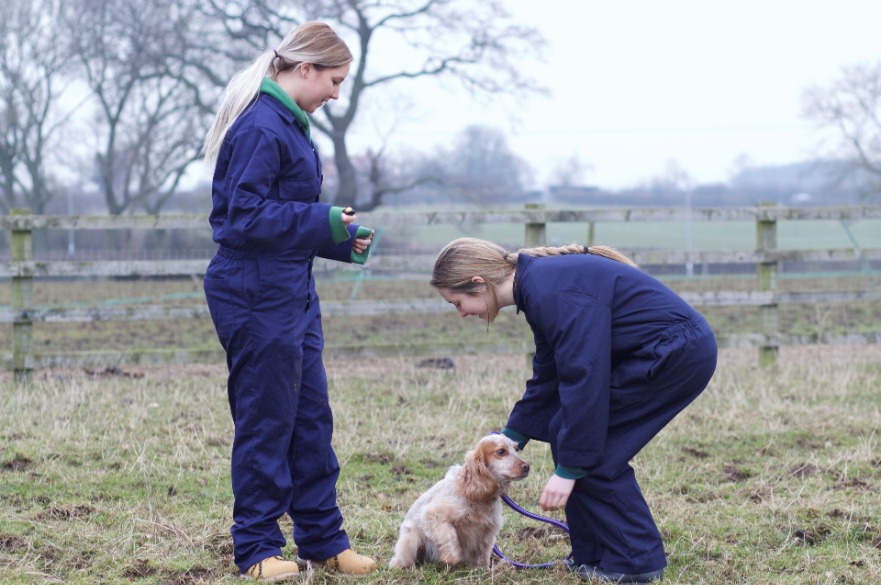Animal Science FdSc
- Level(s) of Study: Foundation degree / Undergraduate
- UCAS Code(s): D325; D326
- Start Date(s): September 2023
- Duration: Two years full-time or three years with placement
- Study Mode(s): Full-time / Sandwich
- Campus: Brackenhurst Campus
-
Entry Requirements:
More information
Introduction:
If you have a passion for animals and want to work in the industry, you're in the right place. This highly practical animal science course will empower you to optimise the lives of the animals on our planet. It'll allow you to discover the area of the animal industry you're passionate about in a friendly and comfortable environment.
You'll explore the science of artificial insemination, understand how to train pets with behavioural problems and learn the depth associated with the various streams of knowledge within the animal industry. Whether you're the next Dog Whisperer or decide to go into the general science industry with a role at a pharmacy giant like Pfizer, our team of expert academics will prepare you for your next step.
From day one, the course embeds crucial competencies and transferrable skills required to work in real-world hands-on roles, moving away from the more traditional theoretical learning style. Our graduates have gone on to work as Animal Welfare Officers, Animal Technicians, and Laboratory Technicians, to name a few. There are a host of other exciting roles for you to explore as a result of choosing this degree. Pursuing a foundation degree increases the practical elements you'll get involved in while providing you with an assortment of work, volunteering and hands-on experiences, without compromising on learning quality. Come to us with a hunger to succeed and we'll provide you with the practical skills and know-how to achieve, empowering you to apply for the roles you dream about doing for real.
Which course is right for you?
We offer four animal science degrees, each with a different focus:
- FdSc Animal Science (this course) - is more vocational, with greater emphasis on practical and applied skills.
- BSc (Hons) Animal Biology - focuses on managed domestic species such as companion, working and farm animals.
- BSc (Hons) Zoo Biology - focuses on captive housed zoo animals and exotic species.
- BSc (Hons) Zoology - covers a diverse range of invertebrate and vertebrate species in relation to their biology, evolution, taxonomy and identification.
-
We provide a full learning package tailored to you, whether that's studying in outstanding facilities, empowering you to achieve your potential or additional learning support, we want to create the best student experience we can - we aren't rated first in the UK for satisfaction on animal science courses for nothing.
-
The vocational nature of the course means that the module content is firmly centred around working in the industry post-graduation. We also run seminars with relevant animal industry professionals, offering you exclusive networking opportunities with the big names in the industry to build those links for when you finish.
-
Studying at Brackenhurst, you'll get the best of both worlds: your own campus specialising in animal, rural and environmental sciences, with one of the world's top 50 student cities just a bus-hop away.
-
We're ranked first in the UK for teaching quality in Animal Sciences courses (The Times and Sunday Times Good University Guide 2024)
What you’ll study
Don’t just take our word for it, hear from our students themselves
"We learn so much, and I have really enjoyed the modules for first year. The lecturers are really great and they really do care for your wellbeing. The lectures and work can be tough in first year, which I found, but it will feel worth it in the end. You don't realise how much you have learned and developed during the year."
(FdSc Animal Science student review, Student Crowd)
Student Work
Video Gallery
Careers and employability
Your career development
Developed in conjunction with representatives from industry, the course is designed to maximise your potential in a broad range of animal-related careers, or to allow you to continue on to further study.
This course can lead to employment both in the UK and abroad, in various roles that include animal training, education, conservation, and research. There are also graduate employment opportunities encompassing endangered species recovery and marine biology. The transferable skills gained will open up a number of other career options to you.
Our graduates have gone on to work at organisations such as:
- wildlife parks
- zoological collections
- welfare organisations
- governmental departments.
You can also progress onto our BSc (Hons) Animal Biology or BSc (Hons) Zoo Biology course.
Placement opportunities
During the course, you'll undertake a minimum of 150 hours of voluntary work experience in the animal industry. Our students have previously been placed with companies such as
- Pfizer
- the Animal Health Trust
- Blackpool Zoo
- Taronga Zoo
- Australia Zoo Wildlife Hospital
- the Mauritian Wildlife Foundation
- Logan Bleu Marine Conservation.
This will allow you to become familiar with the different sectors in the animal industry and take your first steps towards your future career.
NTU Enterprise
You'll also have the opportunity to turn your ideas into a viable business with help from NTU Enterprise, NTU's purpose-built Centre for Entrepreneurship and Enterprise, a support centre to help students create, develop and grow their own businesses.
Campus and facilities
How to apply
Ready to join us? Then apply as soon as you can. Just click the Apply button at the top of the page and follow the instructions for applying. Make sure you check the entry requirements above carefully before you do.
Writing your application and personal statement
Be honest, thorough and persuasive in your application. Remember, we can only make a decision based on what you tell us. So include all of your qualifications and grades, including resits or predicted grades.
Your personal statement is a really important part of your application. It’s your chance to convince us why we should offer you a place! You’ve got 4,000 characters to impress us. Make sure you use them to show how your skills and qualities are relevant to the course(s) you’re applying for. For more hints and tips, take a look at our page on how to write a good personal statement.
Keeping up-to-date
After you’ve applied, we’ll be sending you important emails throughout the application process so check your emails regularly, including your junk mail folder.
You can get more information and advice about applying to NTU on our Your Application page. Good luck with your application!
Getting in touch
If you need any more help or information, please email our Admissions Team or call on +44 (0)115 848 4200.
You can apply for this course through UCAS. If you are not applying to any other UK universities, you can apply directly to us on our NTU applicant portal.
Please note this course is not open to students requiring a Tier 4 / Student Route visa.
Application advice
Apply early so that you have enough time to prepare – processing times for Student visas can vary, for example. After you've applied, we'll be sending you important emails throughout the application process – so check your emails regularly, including your junk mail folder.
Writing your personal statement
Be honest, thorough, and persuasive – we can only make a decision about your application based on what you tell us:
Advice on writing a good personal statement
Would you like some advice on your study plans?
Our international teams are highly experienced in answering queries from students all over the world. We also have members of staff based in Vietnam, China, India and Nigeria and work with a worldwide network of education counsellors.
- Complete this simple form to keep in touch with the International Office.
The University's commitment to delivering the educational services advertised.
